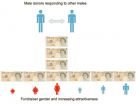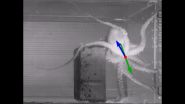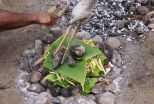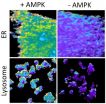(Press-News.org) If you are looking to raise money online for your favorite cause, listen up. A real-world analysis of human behavior reported in the Cell Press journal Current Biology on April 16 shows that men treat online giving as a competitive enterprise. Men will donate four times more money to an attractive female fundraiser in response to the contribution of another male.
Researchers say that they suspect this tendency is a subconscious part of human psychology that exists because it is (or was) evolutionarily beneficial to us.
"People are really generous and are right, a lot of the time, to say that their motives for giving to charity are altruistic, not self-serving," says Nichola Raihani of UCL (University College London). "This does not, however, preclude these motives from having evolved to benefit the donor in some way."
While the findings make perfect sense from an evolutionary point of view, the researchers say they were still quite surprised at how clear it was from their real-world data that people--and particularly men--engage in "competitive helping." Earlier studies had primarily involved games played in the lab.
In the new study, Raihani and Sarah Smith of the University of Bristol relied on a large, UK-based, online fundraising platform to test a key prediction of the competitive helping hypothesis: that males respond competitively to the generosity bids of other males in the presence of attractive females. On the platform, people host fundraising pages including their personal information--name, photo, charity, and the event they are being sponsored for--and collect donations, mostly from people they know. Donations are made and posted sequentially, along with the name of the donor (unless they've opted for anonymity).
"This creates a potential tournament in which donors may compete by responding to how much others have given," Smith says.
Smith's earlier work showed that existing donations on a page act as a kind of "anchor" for current donors. In other words, seeing a small or a large donation influenced what subsequent donors were willing to contribute. Raihani and Smith wanted to know whether the behavior of donors would also be influenced by the gender and attractiveness of the fundraiser, along with the gender of the previous donor. And, indeed, it most certainly was.
That's not to say that anyone is really making these decisions about giving in a conscious or purposeful way, the researchers say.
"We don't think that males are seeing large donations from other males to attractive female fundraisers, and then thinking 'Yeah, I'll give more than him because she will find me more attractive then.' In fact, I think that is quite unlikely," Raihani says.
"I think it is more likely that humans have an evolved psychology that motivates us to behave in ways that would have been, on average, adaptive in our evolutionary past--and may still be nowadays also."
The findings do suggest ways to improve the success of fundraising campaigns. First of all, fundraisers should smile. The attractiveness ratings of female fundraisers had a lot to do with their facial expression. And it may pay off to seed a campaign with larger donations early.
"Large donations can elicit other large donations, so fundraisers might raise more if they get their most generous friends or family to donate early in the appeal," Raihani says.
INFORMATION:
Current Biology, Raihani, N. and Smith, S.:"Competitive Helping in Online Giving" http://dx.doi.org/10.1016/j.cub.2015.02.042
Current Biology, published by Cell Press, is a bimonthly journal that features papers across all areas of biology. Current Biology strives to foster communication across fields of biology, both by publishing important findings of general interest and through highly accessible front matter for non-specialists. For more information please visit http://www.cell.com/current-biology. To receive media alerts for Current Biology or other Cell Press journals, contact press@cell.com.
The body plan of octopuses is nothing if not unique, with a sophisticated brain in a soft, bilaterally symmetrical body, encircled by eight radially symmetrical and incredibly flexible arms. Now, researchers reporting the first detailed kinematic analysis of octopus arm coordination in crawling show that the animals have a unique motor control strategy to match their "odd" form. The researchers report their findings in the Cell Press journal Current Biology on April 16.
"Octopuses use unique locomotion strategies that are different from those found in other animals," ...
Bacteria that naturally reside in the gut are important for health, but recent studies consistently show that a modern lifestyle depletes the gut's collection of microbes. How lifestyle affects the diversity of this gut "microbiome" is unclear, but an analysis of the gut microbiomes of Papua New Guinean and US residents in Cell Reports now suggests that western lifestyle may diminish the variety of bacteria in the gastrointestinal tract by limiting their ability to be transmitted among humans.
"There are several aspects of western lifestyle that have been hypothesized ...
Oral infections are the most common diseases of mankind and are also a key risk factor for heart disease, which is the leading cause of death worldwide. In a review article published in Trends in Endocrinology and Metabolism on April 16, researchers summarize the latest clinical evidence supporting a link between oral infections, which are caused by the bacteria in our mouth, and heart disease, and they emphasize the important role of inflammation in both of these conditions.
"Given the high prevalence of oral infections, any risk they contribute to future cardiovascular ...
By analyzing the activity of "GPS" neurons in mice, researchers at the Stanford University School of Medicine have discovered that the mental maps created by these cells accumulate errors, which are corrected when the animal encounters a wall.
The findings support the theory that these cells, called grid cells, use an animal's perceived speed and direction to help it navigate familiar places.
Thus, as you stumble through your pitch-black kitchen in the middle of the night for a glass of water, your body knows how many steps to take and when to turn to get to the sink. ...
Men give more money through fundraising websites after seeing that other men have donated large amounts and when the fundraiser is an attractive woman, according to new UCL and University of Bristol research.
The scientists say this response by men is unlikely to be conscious and could have an evolutionary function as theories predict that generous actions can honestly signal hidden qualities, such as wealth or desirable personality attributes, to potential partners.
Co-author Dr Nichola Raihani from UCL (Life Sciences), said: "We looked at why people behave generously ...
A nerve neglected in today's era of molecular and genetic analysis has yielded a surprising secret. A handful of neurons control breathing in a fine-tuned but powerful way, scientists have discovered in mice. Among these sensory neurons, two types are dedicated to two specific respiratory functions.
The findings, published in Cell, suggest new ways of considering clinical conditions related to the vagus nerve.
The team, led by Stephen Liberles, Harvard Medical School associate professor of cell biology, has effectively deconstructed the vagus nerve, a key connection ...
The enzyme AMPK initiates a dizzying array of cellular activities, from breaking down worn-out cellular parts to turning on energy production. How does a single protein, activated by a single switch, fulfill so many different tasks without getting them mixed up? To get at such a complex question, cell biologists at Johns Hopkins designed several molecular tools that allowed them to watch, measure and manipulate the activity of the enzyme AMPK in individual compartments within the cell. The new tools have confirmed that at least some of AMPK's ability to multitask comes ...
Angiogenesis inhibitors--a widely used class of cancer drugs designed to shrink tumors by preventing them from forming new blood vessels--often work in the short term, but usually become ineffective within months. Now, a team led by UC San Francisco scientists has discovered a possible reason, one that could lead to a way to address the problem and prevent cancer relapse.
Working with laboratory models of pancreatic and breast cancer, the scientists found that myeloid cells, which originate in bone marrow and are part of the body's first-line of defense--the so-called ...
How does climate change affect the occurrence and distribution of species? This is a key question in the climate debate, and one that is hard to answer without information about natural variation in species abundance. Now researchers from Uppsala University can, for the first time, give us a detailed picture of natural variation through a major study published today in the leading scientific journal Current Biology.
The impact of climate change on species occurrence and distribution is a central issue in the climate debate, since human influence on the climate risks posing ...
The nutrients excreted by fish in their "pee" may be critical to the health of coastal ecosystems. But knowing whether generalizations can be made about how to predict these nutrient levels in various ecosystems has vexed researchers - until now.
In a paper published in Proceedings of the National Academy of Sciences, North Carolina State University associate professor Craig Layman and colleagues show that ecologists can better predict the rates of how these chemical nutrients are transferred by fish if they know the various fish species living in an ecosystem, along ...



